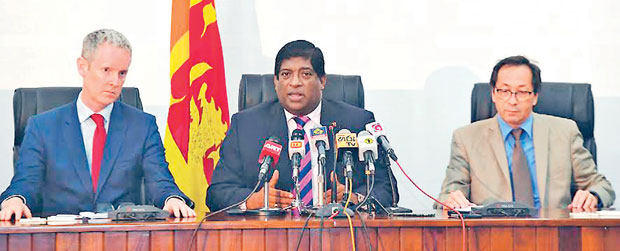Reply To:
Name - Reply Comment
 From left: EIB Vice President South Asia Andrew McDowell, Finance Minister Ravi Karunanayake and European Union Ambassador in Sri Lanka Tung-Lai Margue
From left: EIB Vice President South Asia Andrew McDowell, Finance Minister Ravi Karunanayake and European Union Ambassador in Sri Lanka Tung-Lai Margue
By Chandeepa Wettasinghe
The world’s largest multilateral lender, the European Investment Bank (EIB), will be ramping up its funding to Sri Lanka due to the efforts made by the government, the head of the bank’s delegation currently in town said yesterday during a media briefing held at the Finance Ministry.
“Given the vision shown by all those I have met here today, the detailed preparations made for this visit and the enlightened discussions we’ve had here in Colombo, I would expect new projects to be identified and confirmed later this year,” EIB Vice President South Asia Andrew McDowell said.
He noted that in addition to the continued expansion of financing in areas EIB has in the past funded Sri Lanka due to the satisfactory implementation by agencies here, new areas of investment have also been identified, which would require further studies by EIB.
“We will examine these new areas and we plan to see how Sri Lanka will benefit from them,” he said.
EIB has to date financed water and wastewater management projects, public transportation, tsunami recovery assistance and small and medium enterprise (SME) credit lines worth 300 million Euros since it entered the country in 2002.
Finance Minister Ravi Karunanayake said renewable energy would be one of the new focus areas of EIB funding.
McDowell said EIB funds sustainable development projects based on demand, instead of allocating funding annually per country, and that it will evaluate and approve funding for the projects the Sri Lankan government presents that fall within EIB’s lending criteria.
Karunanayake however said it is too early for Sri Lanka to decide on the size and scope of projects it would forward to EIB to seek funding.
“We would like them to come here and see us, and be confident in us. It’s too premature to talk about the amounts,” he said.
European Union Ambassador in Sri Lanka Tung-Lai Margue said that discussions are underway to change the way the EU and EIB implemented projects in Sri Lanka.
“We’re trying more and more to use a blending approach—to make sure projects are combining grants and loans. The EU can provide grants, and the EIB can provide loans at interesting interest rates with its shrewd expertise,” he said.
According to McDowell, EIB has its own interest rates, which are the lowest in the world compared to other similar institutions, and the interest rates change based on the projects.
“When it comes to the investment grade of a country, it’s not so clear,” he said, adding that interest rates may or may not change based on ratings or income level of a country, but that rates may change depending on instructions and budgetary allocations given to it by the EU.
He noted that EIB is independent from the EU, but that the EU decides the funding limits for each geographical region.
Margue however noted that the largest amount of funding for projects initiated with EIB comes from third parties.
“Through its (EIB’s) label, other private investors will also come in,” he said, explaining the increase in profile Sri Lanka will enjoy with further stamps of approval from EIB.
McDowell noted that with every project, EIB financed just one third of the investment, with the rest coming from private investors.
McDowell’s visit is the first high level visit by an EIB official since the institution entered Sri Lanka 15 years ago, and he noted that with the EIB South Asia branch, which was set up in New Delhi recently, Sri Lanka will see a larger presence of EIB on the ground in the future.
“This is the first country I’m visiting outside of Europe as the newly appointed Vice President of the bank, and that certainly reflects the bank’s great interest and prioritizing attached to the development of this country when it comes to our Asian operations,” he said.
He said that the visit was made possible by the invitation Karunanayake extended in Brussels when a 50 million Euro programme was signed for a wastewater management project in Colombo earlier this year. Margue called the visit a great improvement of Sri Lanka-EU relations ahead of the announcement of the results of Sri Lanka’s GSP Plus application. EIB, owned by the 28 EU nations, extended 80 billion Euros of funding in 2016, and has committed itself to over 570 billion Euros in funding across 160 countries.
The current Sri Lankan government had turned to the western world for funding and support when it first came to power, but has now turned to the previous government’s ally China due to the lack of an early response from the West.